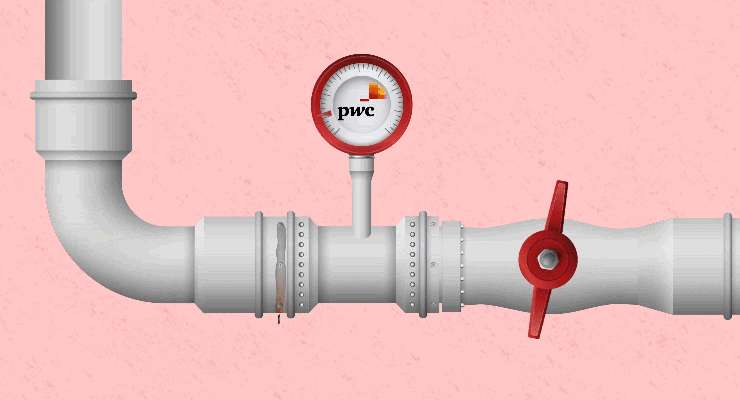
Consulting behemoth PwC is in hot water after it was found to have handed big tech companies confidential information detailing how the government planned to tax… big tech.
The leak first came to light two weeks ago when the Tax Practitioners Board released 144 pages of heavily redacted internal correspondence between 53 PwC partners and 14 of PwC’s honorary global clients.
Since then, CEO Tom Seymour has quit, other senior executives have resigned, a senior partner was banned from working in the industry, the firm sent in global senior leadership to start mopping up the Australian mess, an independent investigation was launched, and former prime minister Scott Morrison (never one to be left out) managed to write himself into the story.
Where did PwC go so wrong?
It starts in 2014, when (now former) PwC partner Peter Collins was advising Treasury on how to streamline tax processes for big multinationals, namely tech companies. The name of the game was to bolster the government’s defences against big players dodging tax in Australia, to be done via the introduction of a new Multinational Anti Avoidance Law (MAAL).
Collins then had the idea to share the government’s plans to clamp down on tax avoidance with a cohort of colleagues, who in turn shared the intel with the targets of the tax reforms — predominantly US tech companies. For the price of $2.5 million (in consultancy fees), the PwC collective handed over an instruction manual outlining exactly what the Australian government had in store for these multinationals. It also came with a precise timeline of when these laws would take effect.
In short: big money makers (and lean tax-payers) were given a heads-up on how to jump over (or side-step) the new rules designed exclusively to stop them fox-trotting all over the Australian tax department.
PwC’s reverse-Robin Hood approach also benefited it handsomely, with the intel winning the firm many new “brand-defining” clients. In an email, Collins deemed it an “opportunity to own this space”.
Aren’t consultants paid to give people advice?
Absolutely they are. And big money too.
In the consultancy world, the concept of “conflict of interest” is scarce. Firms can take on multiple clients from the same industry at the same time. In fact, that’s their biggest drawcard — consultants know what everyone else is doing.
But clients come with contracts and it’s not part of their job description to breach that in order to feed and furnish another.
In the case of the tax leaks, Collins signed three confidentiality agreements with the government in order to be admitted as an adviser on the reforms. Documents were provided on a “strictly confidential basis”, but Collins continuously shared documents, updates, plans, proposals (and the list goes on) internally. His only request to fellow PwC partners was that the intel be treated as “rumour and expectation”.
Which PwC clients have been implicated?
PwC put the feelers out to 23 US tech companies that would cop the brunt of the new laws. It’s believed that Apple, Google and Microsoft were among the big names.
From the hot list, PwC landed a hit list of 14 companies. While these are all named in the email exchanges, their names remain redacted. But pressure is mounting to make this information public, along with the names of all the PwC partners involved in leaking intelligence.
Which politicians are piling on?
Labor Senator Deborah O’Neill has led the political charge against PwC. She wants a public-facing exposé on the full scale of malpractice. Most notably: names.
She’s joined by Liberal Senator Andrew Bragg, who has called for an inquiry that looks beyond just PwC. He wants to bring in the corporate regulator for a fully fledged assessment of how accounting firms, particularly those of the “big four” calibre, are policed in Australia.
Treasurer Jim Chalmers was all fury and adjectives when he found out about the “shocking” and “appalling” breach of trust.
As for the Greens, they want a review into the government’s use of big four firms, which includes PwC, Deloitte, KPMG and EY.
What’s PwC got to say for itself?
PwC has taken a softly-softly approach, quietly letting problem staff go and moving others out of leadership roles. The CEO has called it quits, and the international cavalry have been sent in — including legal business solutions leader Tony O’Malley, taking on the task of chief risk and ethics leader for PwC Australia.
Former Telstra chief Ziggy Switkowski will head up an independent review of the company. It will be on O’Malley to action any and all of his recommendations.
Where does Scott Morrison come in?
It appears the former prime minister is attempting an exit strategy from politics, with PwC to play a part. He reportedly had his sights set on an advisory role at the firm, but sadly (for him) this will not be, with sources at PwC telling The Australian that “hiring Morrison would have brought an unacceptable level of reputational risk to the firm” (which is unrelated to PwC’s tax leak problems).








Recently a group who defrauded the ATO of tens of millions of dollars received substantial prison terms.
The maleficence of a PwC partner attracted a paltry ban on giving advice for a couple of years. Talk about stroking with a wet lettuce! This potentially cost the Government billions of dollars and must really be up there with the “best” corporate crimes (It makes Skase, Bond, etc. look like bit players).
The consequences should be draconian, not just for the prime party but for the company as well.
Tax cheats just doesn’t have the same ring to it as dole bludgers.
Three confidentiality agreements were signed. Don’t these have any consequences for their breach? If not, what is their point? If so, why aren’t these punishments being applied? White-collar crime should result in more prison sentences – at the moment it’s a joke, and the joke is on us.
Now if the leaks were about War Crimes committed by our spooks they would be off for a secret trial and years in jail. WHAT IS THE DIFFERENCE!!!!!
And, as Humphries pointed out last night, when Richard Boyle went public about maladministration in the ATO (because he was getting nowhere internally) to make public the maladministration there (which would have undermined public trust in the ability of the ATO to administer anything?) the government chased him down every sh*thole they could (still there), to keep that under wraps from us…. Shades of Robodebt? …. Assange? “Witness K”? Collaery?….
They made him the ‘criminal’ for blowing the whistle on what was going on behind that arras of theirs and their ‘public service’ – because secrecy, about that level of incompetence, was more important than transparency and accountability? And he carries on under that duress.
… I wonder how they wish this hadn’t got out?
Love the stinger in the tail. Despite all of this, Scotty risks damaging their brand… maybe he can get a gig with Hillsong?
Tried Hillsong and even that show didn’t want him.
Insider trading when it involves deal and share profits carries a criminal penalty and jail. I’m waiting to see some criminal charges laid here for the massive thieving of taxpayer tax money, and consultancy fees misused for corporate purpose. These partners have roped in hundreds of thousands in rewards for using this insider info. Jail rather than big bags of money to go quietly is what is required here. ASIC where are you?
Devise a map for the government to increase taxes : then sell off a back-roads avoidance map to your other clients?
Makes you wonder how many other consultancies are doing the exact same thing, and why all governments should stick to inhouse advice from public servants. For starters the money saved would be enormous.
Makes some sense but in-house government advisors must give the advice the politicians want to hear or else. I have personally been in this situation and it is not pleasant. Outside consultants toe the line at risk of their reputation. Their art is supporting the government but appearing independent.
How odd. My experience is the opposite. The in-house advisors – that is, public servants – have no axe to grind and can be genuinely committed to serving the public. This is what makes them so annoying to modern politicians who are revolted by such tendencies and only want blind obedience. So they instead bring in consultants to replace the public servants, whose business is to tell the client what the client wants to hear, whose whole motivation is making money, who can be dismissed if they stray from that course and who might in due course return the favour of the politicians’ patronage by offering generous sinecures in return when the politicians want to move on. The politicians also have large numbers of ideologically motivated special advisors who can provide the sort of crazed fantasy politics that is so fashionable now. Both the special advisors and the consultants, as another bonus, cannot usually be interrogated by any parliamentary committees in the way public servants can, thus helping to free ministers from the annoyance of being answerable to anybody.
Sadly, all this has over many years very badly damaged the public service so it has been reduced drastically in resources, competence and ethics, as proven by the horrible mountain of evidence uncovered during the robodebt inquiry. And yet the public service remains in general the only viable source of competent routine advice for ministers and accordingly it should be a top priority of the government to restore the public service so it can do its job on behalf of us all.
Agree. Nepotism can exits in the public service, esp in siloed business units etc, but at least there are severe consequences for dodgy behaviour when uncovered.
Yet the private sector REWARD$ this same dodgy behaviour without, it seems, any consequences beyond a temporary blip in their bottom line.
Robodebt cost lives at the hand of this same cabal of £#*%’s.
So are we now going to protect these barstards and let them run off with the gold? Just like Our Commonwealth did for slave owners?
All we seem to do is protect these ‘qualified’ men in their sombre suits and silky old boy ties.
C’mon Aussies, time to lift their preistly corporate robes and see the extent of carnage before they all get transferred off to another parish.
You are absolutely spot on with your analysis. I would add that this as also cost $millions us in how Pandemic was handled, everything from the PLAN to vacinate everyone, Aspen Medical, and lets not forget the app that flopped. It will take decades to get Public Service up to scratch after damage done to it by both sides with their multiple advisors both in and outside Public Service.
My personal situation when using a consultant was to insist that, whatever advice they gave, it would stand up to the most intensive scrutiny in a court of law.
If this was a dole bludging family, a migrant racket, an ethnic gang or a Union thug the media, led by Murdoch and his cronies would be baying for blood and a long stretch. They wouldn’t let up until ‘something was done.’
Instead, this pervasive, persistent corporate criminal corruption is framed in the narrative of a few bad apples, there’s a collective shrug and we’re back to updates on MAFS and how dangerous anyone to the left of Peta Credlin is to the Australian way of life.
Corporate criminals always go easy on their corporate criminal mates.
Agreed. Can somebody reach out to the youth crime facebook vigilantes in Queensalnd and tell them to get their baseball bats down to Sydney where the real crimes are happening?